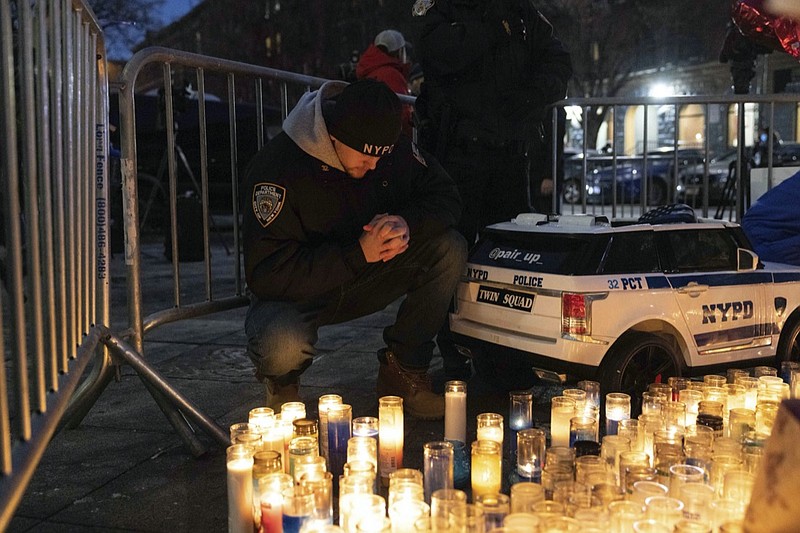NEW YORK (AP) - A New York City police officer gravely wounded last week in a Harlem shooting that killed his partner has also died of his injuries, police said Tuesday.
Officer Wilbert Mora, 27, died at a Manhattan hospital four days after he and Officer Jason Rivera were shot while responding to a domestic disturbance call.
"It's with great sadness I announce the passing of Police Officer Wilbert Mora," NYPD Commissioner Keechant Sewell said in a tweet.
"Wilbert is 3 times a hero. For choosing a life of service. For sacrificing his life to protect others. For giving life even in death through organ donation. Our heads are bowed & our hearts are heavy."
Mora entered the police academy in October 2018 and was assigned to Harlem's 32nd precinct since November 2019. He made 33 arrests, police records show.
The two officers were fatally wounded Friday after they were called to a Harlem apartment by a woman who said she needed help with her adult son. The gunman, Lashawn J. McNeil, threw open a bedroom door and shot the officers as they walked down a narrow hall, authorities said.
A third officer shot McNeil. The gunman, 47, died Monday, authorities said.
Irina Zakirova, a professor at John Jay College of Criminal Justice, remembered Mora as an earnest and engaged student.
"He was so certain about becoming a police officer - a good police officer - and he was looking forward to taking the next step for a police career," she said Tuesday.
"He cared about people and the community," Zakirova said, adding that he was particularly interested in finding different and innovative ways in improving relationships between police and the neighborhoods they patrolled.
The slayings came in Mayor Eric Adams's first weeks on the job. The Democrat, a former police captain, campaigned partly on a promise to improve public safety. On Monday, he unveiled what he called his "Blueprint to End Gun Violence."
The multi-pronged strategy includes searching travelers for illegal guns, getting courts moving again after pandemic slowdowns and pushing lawmakers to give judges more leeway to hold potentially violent defendants without bail.
Mora had been in critical condition since the shooting. He was moved Sunday from Harlem Hospital to NYU Langone Medical Center, where he died.
Mora's funeral arrangements have not been announced.
The exact circumstances of the shooting were still under investigation, but police said McNeil had a handgun with a high-capacity magazine that had been stolen years ago in Baltimore. Police said Monday that while searching the apartment over the weekend they also found a loaded semi-automatic rifle under McNeil's mattress.
McNeil's mother said she was trying to convince her son to get help for mental health issues and that she wouldn't have called 911 had she known he was going to use violence against the officers.
"If I knew, I never would have made the phone call," Shirley Sourzes told the New York Post in an article published Monday on the Post's website. "I would never have called!"
A funeral was planned for Rivera on Friday at St. Patrick's Cathedral in Manhattan. Rivera was 22 and had joined the force in 2020. He had been assigned to the 32nd precinct in Harlem since graduating last May. He'd made 15 arrests in his short career, according to police records.
Mora and Rivera's deaths deaths' echoed the 2014 killings of another pair of officers, Wenjian Liu, 32, and Rafael Ramos, 40, who were fatally shot by a man who ambushed them as they sat in their patrol car.
In an essay at the police academy, Rivera wrote that he became an officer to "better the relationship between the community and the police," acknowledging unpleasant experiences with police while growing up in the Inwood section of Manhattan.
